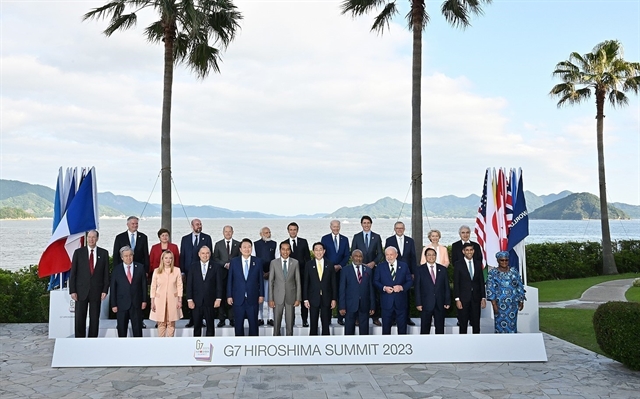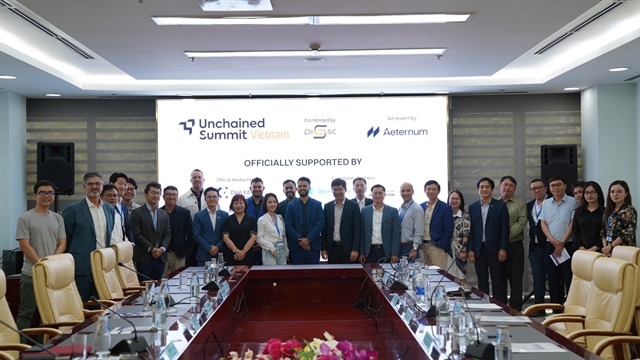 Politics & Law
Politics & Law

 |
| Heads of delegations at the G7 expanded summit in Hiroshima, Japan on Saturday. — VNA/VNS Photo Dương Giang |
HÀ NỘI — Prime Minister Phạm Minh Chính’s recently ended trip at the expanded Summit of the Group of Seven (G7) and a working visit to Japan was a success in both bilateral and multilateral aspects, Minister of Foreign Affairs Bùi Thanh Sơn told the media.
According to Minister Sơn, during nearly three days in Japan, PM Chính hosted and attended about 40 activities, including working sessions and meetings with Japanese leaders as well as roundtables, business meetings, friends in Japan, as well as discussions with leaders of countries and international organisations.
Multilaterally, Việt Nam contributed to the G7's expanded summit approaches and important solutions from the perspective of a developing country, aiming to promote industrialisation, modernisation and extensive and comprehensive international integration, the minister said.
At the working sessions, PM Chính highlighted many important messages, including promoting a more substantive and effective global partnership, upholding international solidarity, and persevering with multilateral cooperation in order to solve unprecedented challenges currently.
The PM also stressed that sustainable development, climate change response, emissions reduction and energy transition can only be successful through a global approach with the engagement of all people, ensuring balance and reasonableness in line with different conditions and development levels of countries.
He further urged that in the spirit of the rule-of-law, respect for the UN Charter and international law, and settlement of all disputes through peaceful measures should be promoted and implemented with specific commitments.
According to Minister Sơn, ideas and proposals given by PM Chính were highly valued by leaders of countries and international organisations, contributing to building a balanced and holistic approach to addressing global challenges. The substantial and responsible participation of Việt Nam has contributed greatly to the joint efforts of the international community to maintain peace and stability and speed up economic recovery and development on the basis of equality and mutual benefit, matching the interests and concerns of developing countries.
On the bilateral aspect, the PM’s talks and discussions with the Japanese PM, leaders of Hiroshima and different circles of Japan contributed to further enhancing political trust and promoting the Việt Nam-Japan extensive strategic partnership. This is especially meaningful as the two sides are celebrating the 50th anniversary of their diplomatic relations, Sơn said.
PM Chính also had bilateral meetings with G7 leaders, guests and representatives from international organisations attending the summit to discuss specific and practical measures to bolster bilateral relations and foster coordination in matters of shared concerns.
During the discussions, the partners praised the role and position of Việt Nam and affirmed their willingness to strengthen all-round cooperation, focussing on economy and trade as well as the settlement of emerging issues such as food security, energy security, climate change response, green economy, circular economy and innovation.
At the summit and bilateral meetings, leaders of all countries underscored the significance of ensuring maritime and aviation security and safety as well as the settlement of disputes and differences through peaceful measures on the basis of international law, especially the United Nations Convention on the Law of the Sea (UNCLOS) 1982, along with the full implementation of the Declaration of Conduct of Parties in the South China Sea (known as East Sea in Việt Nam) (DOC) and the completion of an effective and substantive Code of Conduct (COC) as soon as possible.
The G7 expanded Summit took place in Hiroshima from May 20-21 under the chair of Japan. The summit adopted a Hiroshima Action Statement for Resilient Global Food Security and agreed on the need to create new motivation for economic recovery and development, G7 leaders also agreed that amid the complicated world situation, it is necessary to uphold multilateralism and international cooperation, and cope with disputes through peaceful measures, protecting security and people’s safety.
The countries underlined the need to strictly implement the DOC, and move towards achieving a substantive and effective COC in accordance with international law, especially the 1982 UNCLOS.
Regarding specific impacts of PM Chính’s trip on the Việt Nam-Japan extensive strategic partnership, Minister Sơn said that during his stay in Japan, the Prime Minister took part in 13 working sessions with Japanese partners.
He and Japanese PM Fumio Kishida agreed to promote the extensive strategic partnership between Việt Nam and Japan for peace and prosperity in Asia to a new level, especially in 2023, which marks the 50th anniversary of the establishment of bilateral diplomatic ties. They also agreed to increase Japan's provision of new-generation ODA with high incentives, simple and flexible procedures for large-scale strategic infrastructure development projects in Việt Nam.
The two leaders reached a consensus on further promoting cooperation in new potential fields such as green transformation, digital transformation, emission reduction and energy transition.
They agreed to continue fostering and deepening collaboration in people-to-people exchanges, locality-to-locality cooperation, education-training and tourism, while working closely together in supporting and creating favourable conditions for the nearly 500,000-strong Vietnamese community in Japan.
Việt Nam and Japan also concurred to coordinate their stance on issues of mutual concern at multilateral and regional forums such as ASEAN, the United Nations, and the Asia-Pacific Economic Cooperation (APEC), the ASEAN-EU Meeting (ASEM), as well as on the East Sea issues.
Minister Sơn underlined that the outcomes of PM Chính’s trip to Japan contributed to sustainably promoting the extensive strategic partnership with Japan on the foundation of strong political trust, practical economic cooperation and diverse cultural, social and people-to-people exchanges, meeting the aspirations and interests of both peoples. — VNS




